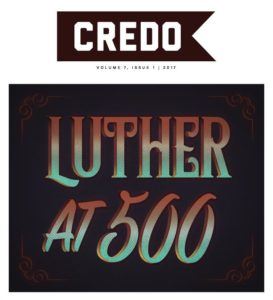This year, being the 500th anniversary of Martin Luther’s posting of the 95 Theses, two of my great loves happen to be converging: my love for my children (ranging in age from 2 to 11) and my love for the Protestant Reformation. For the last several months I’ve been handing my children a steady stream of books about the Reformation with varied responses. Some they’ve adored; others they endured. We’ve also had the opportunity to watch a few related videos together. In no particular order, below are several Reformation resources we’ve used with a bit of explanation about each.
 Susan Leigh, illustrated by Dave Hill. Luther: The Graphic Novel – Echoes of the Hammer. St Louis: Concordia, 2011.
Susan Leigh, illustrated by Dave Hill. Luther: The Graphic Novel – Echoes of the Hammer. St Louis: Concordia, 2011.
Of all the books on the Reformation I shared with my kids, this one is far and away the most beloved. It’s the only one they actually request permission to read. As the subtitle suggests, it’s basically a biography of Martin Luther in the form of a long comic book. In addition to the fast-paced story and gripping graphics, it’s packed with informative sidebars, maps, and explanations of important theological concepts (e.g., indulgences). You’ll learn all about Martin, Katherine, Zwingli, Melanchthon, and all the other important first-generation Reformers. My only caution with it is that it’s written from a very strong Lutheran perspective and portrays non-Lutheran Protestants as dubious fellows. But with a bit of parental guidance, it’s a wonderful way to share the story of the Reformation with your children (adults will love it too!).
Simonetta Carr. Christian Biographies for Young Readers. Grand Rapids: Reformation Heritage, 2008-.
This is a beautiful series of hardcover, pictorial biographies of various Protestant heroes pitched at children ages 7-10. While new volumes are still being added, ones currently exist for Luther, Calvin, Knox, and Lady Jane Grey. The content is kid-friendly, interesting, devotional, and accurate, and the pictures are really quite stunning. They’re the sort of books you could enjoyably read aloud to your children sitting with you on the couch in about 20 minutes.
Richard Newton. Heroes of the Reformation: Life-Changing Lessons for the Young. Birmingham: Solid Ground Christian Books, 2005.
Now here’s a very unique book. It’s a collection of children’s sermons by a Presbyteri an pastor who lived from 1813-1887. Each of the 34 sermons summarizes the life of a different Reformer (many lesser-known) in 3 or 4 pages and attempts to draw practical lessons for godliness from their lives. While they do feel a bit hagiographic at times, they’re written in a thrilling, conversational style which my oldest son found hard to put down. It also contains dozens of dramatic 19thcentury wood-cut illustrations. I imagine it’d be most appropriate for kids 10 and older. It would also make a great devotional for family worship.
an pastor who lived from 1813-1887. Each of the 34 sermons summarizes the life of a different Reformer (many lesser-known) in 3 or 4 pages and attempts to draw practical lessons for godliness from their lives. While they do feel a bit hagiographic at times, they’re written in a thrilling, conversational style which my oldest son found hard to put down. It also contains dozens of dramatic 19thcentury wood-cut illustrations. I imagine it’d be most appropriate for kids 10 and older. It would also make a great devotional for family worship.
Diana Kleyn with Joel R. Beeke, illustrated by Caffy Whitney and others. Reformation Heroes. Grand Rapids: Reformation Heritage, 2007.
A large, glossy, coffee-table style book, this volume provides brief biographies of around 40 Reformation heroes (including some pre-Reformers, radical Reformers, and second generation Reformers) accompanied by copious black and white pictures. The book also includes a very helpful timeline enabling the placement of each figure in relation to the others. The great strength of this volume is its ability to introduce the theology underlying the Reformation and the Reformers in language children 8 and older will understand. It delves into the differences between Luther and Zwingli and even explains the Counter-Reformation to children. I do, however, have several hesitations with this volume. First, like Heroes of the Reformation mentioned above, it feels quite hagiographic, to the point that I find myself regularly questioning its historical accuracy. Moreover, the language of the book is surprisingly antiquated, sounding far more like Charles Dickens than J. K. Rowling. And lastly, the majority of the biographies are relatively wordy and lengthy, far longer than most children have the attention span to tolerate. But as far as being a thorough overview of nearly all the major and minor players in the Reformation with the best emphasis on theology I’ve found, this book is a great tool to have in the toolkit.
The Trailblazers Series by various authors. Ross-Shire, UK: Christian Focus.
This is a substantial series of around 60 biographies by different authors pitched at slightly older children (maybe 10-14). All the subjects are conservative, evangelical Protestants, and volumes exist for several Reformation heroes including Luther, Calvin, Knox, and Zwingli (and possibly more). Our family hasn’t read all of them, but those we did use we found helpful. Unlike the books I mentioned above, this series does not include pictures.
Thunderstorm in Church by Louise A. Vernon, illustrated by Allan Eitzen. Scottsdale, PA: Herald Press, 2002.
Of all the resources listed here, this is the only work of historical fiction. It’s a tale about Martin Luther’s son, Hans, imagining what life must have been like in the Luther household. As Hans learns about the accomplishments of his father and their meaning, so does the reader. From everything I can tell, it’s historically and theologically accurate, through personally I’m not a big fan of teaching history through historical fiction. The narrative format should easily keep the attention of your children 8 and older. I should point out that to advertise this book as illustrated is a stretch; I could only find five illustrations throughout. Similar volumes exist by this author about John Wycliffe, William Tyndale, Johann Gutenberg, Erasmus, Menno Simons, and the Anabaptists.
G. Johns. Stories of the Reformation in Germany and England for Young People, with A Child’s Life of Luther by Anonymous. Harrisonburg, VA: Sprinkle, 2003.
This interesting volume combines two shorter books, both written in the late 19th century, and is peppered with several woodcut illustrations. The first book is an overview of the Reformation with special attention paid to the English Reformation. The second, like the title suggests, is a brief biography of Luther. I have both concerns with and commendations for this volume. First, as far as concerns, the book intentionally avoids discussing the theology and instead focuses on telling the story of the Reformation. As it explains in the introduction, it does this because it assumes the doctrinal debates of the Reformation are far above the heads of virtually all children. While there is some truth in this assertion, I firmly believe that children can understand far more theology than many adults presume. Furthermore, if the Reformation was primarily a theological event, as we Protestants claim, how in the world can you understand it without at least an elementary orientation to the theological debates? As for commendations, I could mention many. The book is a well-constructed, durable hardcover. It is visually attractive and pleasantly formatted. The prose is fast-paced, gripping, and easy to read, though in typical Victorian English. I particularly appreciated that A Child’s Life of Luther contains copious quotes by Luther himself, at least one per page. If this volume is supplemented with a good theological explanation (such as Reformation Heroes mentioned above), it could be a captivating introduction to the story of the Reformation. While conceptually it’s pitched at children 8 and older, due to the antiquated language, it’s probably better suited for children over 10.
 The Torchlighters: Heroes of the Faith
The Torchlighters: Heroes of the Faith
The Torchlighters series is a collection of 30-minute dramatic animated videos introducing the lives of important Christians from history. While new episodes are still in the works, ones already exist for William Tyndale and Martin Luther. We’ve watched all the episodes in the series (some several times) and they’re all well-done, moving, informative, and thoroughly enjoyable. My boys will actually watch them for fun. They appear to be historically accurate, and I have no reason to doubt their reliability. Due to the format they are obviously very introductory and summarizing, but for what they are, they serve their purpose well. The entire collection would make a wonderful addition to any family or church library and could be used fruitfully in a children’s Sunday school.
This Changed Everything: 500 Years of the Reformation produced by the Christian History Institute
This 3-hour documentary on the Protestant Reformation feels similar to something you’d see on the History Channel. Through a combination of interviews with scholars, visits to historical sites, and panoramic shots of cathedrals, villages, and artifacts, the viewer gets a good overview of the history and theology of the Reformation. While younger children would be bored to tears, my older kids (7+ years old) actually enjoy watching it with me. The fact that it’s narrated by David Suchet, whom my children recognize from Focus on the Family Radio Theater, makes it all the more attractive. I do, however, have a significant concern with this project. It attempts to be theologically neutral, meaning it gives Roman Catholic scholars as much of a hearing as Protestants and tries to come across as objective and unbiased. In my opinion, this results in a confused message wherein the viewer can’t really tell if the Reformation was a courageous and necessary defense of the gospel, or an unfortunate squabble over theological minutiae. Yet, if supplemented by other good resources and a healthy dose of parental guidance, This Changed Everything can be a very engaging tool in teaching children about the history and theology of Reformation.
For those of us who believe the Reformation was a sovereign work of God in recovering the gospel, we have a Christian duty to teach this to our children. Thankfully, the same God who prompted Luther to post his 95 Theses has also provided us with many excellent resources for teaching the meaning and significance of the Reformation to the next generation. Hopefully these I’ve mentioned here will be useful to that end.


